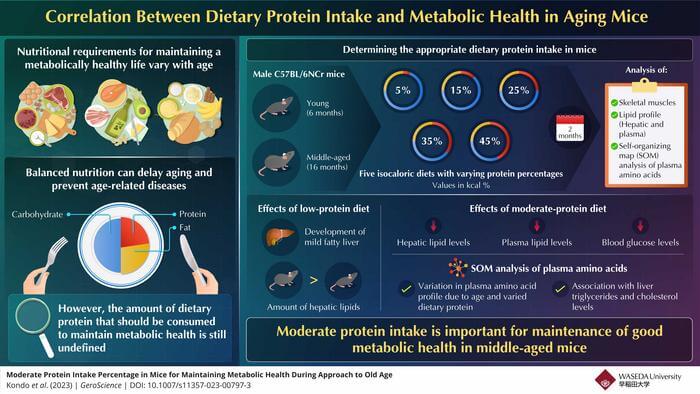The food we eat has a profound impact on our health and how long we live. Scientists have found a clear link between our nutritional needs as we age and our metabolic health.
By eating the right foods for our age, we can maintain our metabolic health, leading to a longer period of disease-free living and an extended lifespan. Previous studies have shown that adjusting calorie and protein intake can improve the health and lifespan of animals like rodents and primates. Recent research on mice has even shown that the proportions of proteins, carbohydrates, and fats in their diets can affect their cardiovascular health and aging. However, the precise amount of protein needed to maintain metabolic health remains unknown.
A new study published in the journal GeroScience on April 28, 2023, led by Assistant Professor Yoshitaka Kondo from Waseda University in Japan, sought to determine the optimal amount of dietary protein for improving metabolic health in aging mice. The research team, including scientists from various institutions, conducted a two-month experiment involving young (6 months old) and middle-aged (16 months old) male C57BL/6NCr mice. These mice were fed diets with different protein levels ranging from 5% to 45%. After the two-month period, the researchers assessed the impact of these varied protein diets by measuring factors such as skeletal muscle weight, lipid profiles in the liver and plasma, and the patterns of amino acids in the plasma using self-organizing map (SOM) cluster analysis.
Assistant Professor Kondo explained the motivation behind their study, saying that the optimal balance of macronutrients for ideal health outcomes can vary across different stages of life. Previous studies indicated the potential for reducing age-specific mortality by adjusting the protein-to-carbohydrate ratio in the diet as individuals approach old age. However, the specific amount of protein required to maintain metabolic health during the aging process remained unclear.
The study’s findings revealed that mice on a low-protein diet developed mild fatty liver, with increased levels of hepatic lipids observed in middle-aged mice compared to their younger counterparts. Conversely, mice on a moderate-protein diet showed reduced blood glucose and lipid levels in both the liver and plasma, indicating better metabolic health. The researchers also noticed that the concentrations of individual amino acids in the plasma varied with age and the protein content in the diet. This was further confirmed by the SOM analysis of plasma amino acids. Additionally, the SOM analysis showed a correlation between different protein intake levels and the amounts of hepatic triglycerides and cholesterol.
Professor Kondo commented on the study’s implications for public health, stating that protein requirements change throughout life, with higher needs during younger reproductive years, decreasing in middle age, and rising again as protein efficiency declines in older age. He suggests that increasing daily protein intake in meals may promote metabolic health in people, and a well-balanced macronutrient composition at each life stage could potentially extend overall health span.
In conclusion, maintaining a balanced diet with moderate protein intake could be crucial for enjoying a long and healthy life.
If our reporting has informed or inspired you, please consider making a donation. Every contribution, no matter the size, empowers us to continue delivering accurate, engaging, and trustworthy science and medical news. Independent journalism requires time, effort, and resources—your support ensures we can keep uncovering the stories that matter most to you.
Join us in making knowledge accessible and impactful. Thank you for standing with us!

